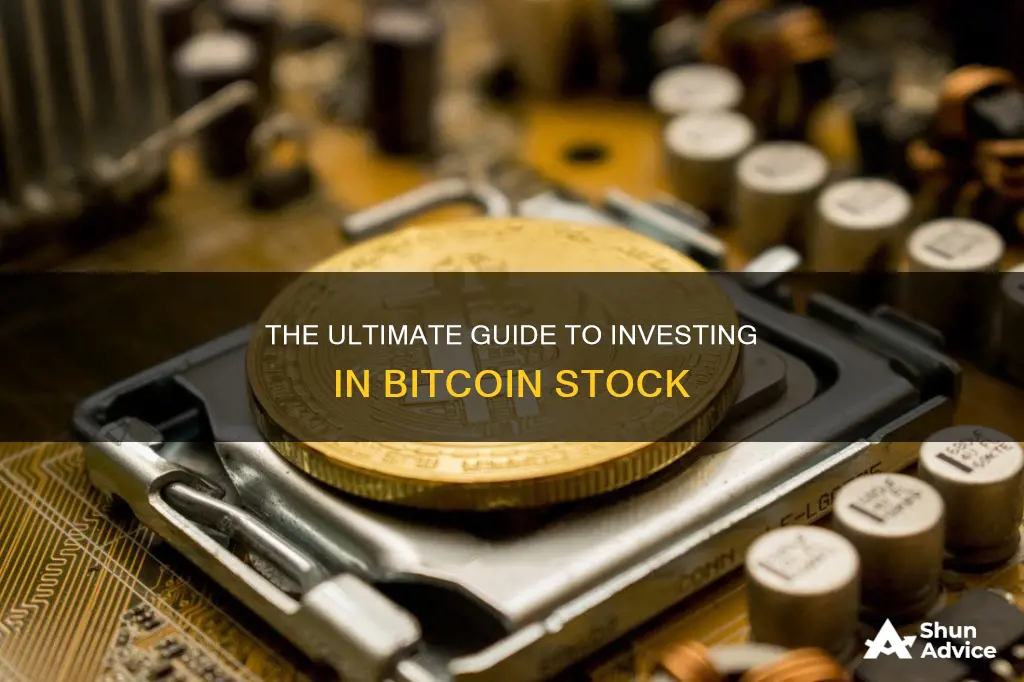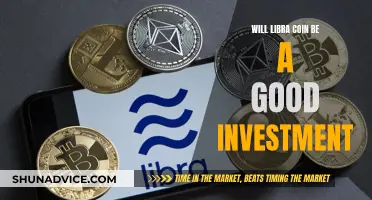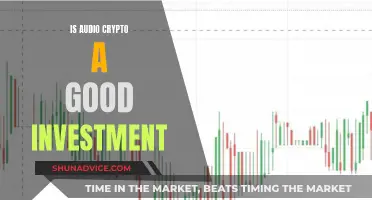
Bitcoin is a decentralised, peer-to-peer digital currency. It was created to allow online payments to be sent directly from one party to another without going through a financial institution. Bitcoin is a hot investment that is gaining mainstream adoption. There are several ways to invest in Bitcoin, including Bitcoin wallets, cryptocurrency exchanges, traditional brokers, money transfer apps, Bitcoin ATMs, and Bitcoin ETFs. When investing in Bitcoin, it is important to consider the risks and potential rewards, as the market is subject to sharp swings.
| Characteristics | Values |
|---|---|
| Current Bitcoin price | $59,389.85 USD |
| 24-hour trading volume | $28,049,588,427 USD |
| Market cap ranking | #1 |
| Circulating supply | 19,742,815 BTC coins |
| Max supply | 21,000,000 BTC coins |
| First introduced | January 2009 |
| Founder | Satoshi Nakamoto |
What You'll Learn

Bitcoin wallets
Once you've purchased Bitcoin, you'll need a place to store it. There are two types of digital wallets: hot wallets and cold wallets.
Hot wallets are connected to the internet and are often free to use. They make it relatively easy to carry out transactions using crypto, but they may be more vulnerable to hackers.
Cold wallets are not connected to the internet and are considered to be more secure. They tend to cost money as you have to buy a piece of hardware to store your crypto. They may be harder for other users to reach, but if you lose the device, recovery could be very difficult.
There are many different types of hot and cold wallets available, each with its own features and supported cryptocurrencies. Some popular hot wallets include Crypto.com DeFi Wallet, Zengo, Guarda, Exodus, Coinbase Wallet, and Trust Wallet. Examples of cold wallets include Ledger and Trezor.
The Bitcoin Investment Trust: A Short-Term Focus
You may want to see also

Cryptocurrency exchanges
A cryptocurrency exchange, or digital currency exchange (DCE), is a business that allows customers to trade cryptocurrencies or digital currencies for other assets, such as conventional fiat money or other digital currencies. Cryptocurrency exchanges can be online or brick-and-mortar businesses. Online exchanges trade electronically transferred money and digital currencies, while brick-and-mortar exchanges accept traditional payment methods and digital currencies.
There are two main types of cryptocurrency exchanges: centralized and decentralized. Centralized cryptocurrency exchanges are overseen by a third party (called an exchange operator) to ensure customer sign-up and trading runs smoothly. Decentralized cryptocurrency exchanges, or DEXs, lack third-party oversight, are open-source, and depend on peer-to-peer (P2P) trading.
When choosing a cryptocurrency exchange, it's important to do your research. Here are some factors to consider:
- Deposit and withdrawal limits
- Regional restrictions and regulations
- Verification requirements
- Security
- Fees
- Currency pairs offered
- Reputation and history of the exchange
Some popular cryptocurrency exchanges include:
- Binance
- Coinbase
- Gemini
- Kraken
- Crypto.com
Bitcoin Investment: Can You Make Money?
You may want to see also

Traditional stockbrokers
Other traditional brokers that allow customers to buy and sell Bitcoin include eToro, which allows users to use PayPal to purchase Bitcoin, and Coinbase, which charges a fee of about 0.5%.
When using a traditional stockbroker, you will need to connect your bank account, debit card, or credit card to your account. You will also need to provide personal identification documents.
It is important to note that Bitcoin and other cryptocurrency investments are not protected by insurance from the Securities Investor Protection Corporation (SIPC). Therefore, it is crucial to carefully consider the risks before investing in Bitcoin.
Musk's Bitcoin Bet: Why He Invested
You may want to see also

Bitcoin ATMs
To buy Bitcoin from a Bitcoin ATM, first, get a Bitcoin wallet. Then, find a Bitcoin ATM near you and enter the amount you want to purchase. You may be required to verify your identity, depending on local regulations and the amount you are purchasing. Provide your Bitcoin wallet address by using the ATM's camera to scan the QR code from your Bitcoin wallet app. After that, pay using cash, credit card, or payment app. The Bitcoin will be received in your Bitcoin wallet in a few minutes, and the ATM will provide a transaction ID to monitor the status of the purchase.
Selling Bitcoin from a Bitcoin ATM works in a similar way. Enter the amount you want to sell, and verify your identity if necessary. Send Bitcoin to the provided address by scanning the QR code and sending it using your Bitcoin wallet app. Once the ATM receives the Bitcoin, it will dispense your cash, which can be monitored using your Bitcoin wallet app.
Before carrying out a transaction, it is important to look at the fees charged and have a plan for where to send the Bitcoin once purchased.
Is It Too Late to Invest in Bitcoin?
You may want to see also

Bitcoin ETFs
A spot Bitcoin exchange-traded fund (ETF) is an investment that gives mainstream investors a regulated way to invest in Bitcoin through their brokerage accounts. The Securities and Exchange Commission (SEC) approved the first spot Bitcoin ETFs in January 2024, three years after the first Bitcoin futures ETFs were approved.
Spot Bitcoin ETFs are exchange-traded products (ETPs) that hold Bitcoins in a secure digital vault, which registered custodians manage. This kind of ETF mirrors the price of Bitcoins in the crypto market. The ETF buys Bitcoins from other holders or through authorised cryptocurrency exchanges. The tokens are then stored in a digital wallet, often using several layers of security, including cold or offline storage, which reduces the risk of hacking.
The ETF then issues shares corresponding to the number of Bitcoins it holds. These shares are available on traditional stock exchanges. The share price generally reflects the currency's prevailing market price. Shares track the price of Bitcoin as closely as possible and the ETF occasionally rebalances its holdings by buying or selling tokens.
Special Considerations
The creation and redemption process is handled by authorised participants (APs), typically large financial institutions, which create or redeem ETF shares based on market demand. If the ETF shares trade at a premium or a discount to the actual price of Bitcoins, the APs create or redeem ETF shares in large blocks. This means they essentially arbitrage the difference so the ETF share price aligns with the cost of Bitcoins.
Spot Bitcoin ETFs vs. Other Bitcoin ETFs
Spot Bitcoin ETFs differ from derivatives-based Bitcoin ETFs in how they are structured and how much exposure they offer to Bitcoin's price changes. Spot Bitcoin ETFs directly hold Bitcoins, but derivatives-based Bitcoin ETFs use financial instruments like futures contracts to replicate Bitcoin's prices.
Spot Bitcoin ETFs thus have direct ownership of Bitcoins, making them more transparent and more straightforward for investors. By contrast, derivatives-based ETFs can be more opaque, given that their value is derived indirectly from futures contracts, which can be influenced by various market factors beyond Bitcoin's spot price.
Advantages and Disadvantages of Spot Bitcoin ETFs
Advantages
- Convenience: Spot Bitcoin ETFs are more accessible to a broader range of investors, substantially lowering the barriers to entry into the crypto market.
- Liquidity: Spot Bitcoin ETFs make buying and selling Bitcoins easier through familiar brokerage accounts.
- Regulatory Oversight: Spot Bitcoin ETFs are subject to rules that ensure transparency and protect investors.
- Tax Implications: In certain jurisdictions, spot Bitcoin ETFs could have tax benefits compared with holding cryptocurrencies directly.
Disadvantages
- Crypto Volatility: The most obvious is the market volatility of Bitcoin prices, which could lead to significant financial loss.
- Regulatory Uncertainty: There is a lack of a clear regulatory framework to protect investors. Until more comprehensive oversight and standards are established, there remains uncertainty about how risks like fraud, manipulation, and loss of assets will be treated.
- Security Risks: The number of coins that spot Bitcoin ETFs would have to hold to be viable makes them attractive targets for cybercriminals. While ETF managers use multilayered security protections like cold storage and encryption, no system is impenetrable.
- Management Fees: Spot Bitcoin ETFs charge management fees or expense ratios to cover operational costs, diminishing returns over time.
- Tracking Error: While spot Bitcoin ETFs try to mirror the performance of Bitcoin closely, tracking error differences between the ETF share cost and the value of Bitcoin can occur due to liquidity in the market, delayed rebalancing of the fund’s holdings, and management fees.
Bitcoin Mining: Worth the Investment?
You may want to see also
Frequently asked questions
There are several ways to invest in Bitcoin, including purchasing it from a cryptocurrency exchange, using a traditional stockbroker, a money transfer app, a Bitcoin ATM, or a Bitcoin exchange-traded fund (ETF).
Hot wallets are connected to the web, while cold wallets are used for storing large amounts of coins offline.
Bitcoin is a risky investment due to its volatile nature. It is important to carefully consider your goals and strategy before investing. A common rule of thumb is to invest no more than 10% of your portfolio in individual stocks or risky assets like Bitcoin.







